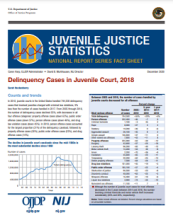Juvenile correctional facilities
NIJ-Funded Research on Firearms Violence in Urban Cities Advancing Scientific Evidence to Inform Practice
In this full thematic panel, renowned experts will present a series of papers summarizing the newest findings of NIJ-funded research projects on criminal offenses with firearms in urban areas. Researchers used various criminological and other theories, including routine activity theory, socio-ecological and socio-environmental perspectives, and advanced mixed-study methods, including surveys and spatio-temporal designs, to produce scientific evidence to inform practice.
See the YouTube Terms of Service and Google Privacy Policy
Juvenile Justice Responses to the COVID-19 Pandemic Crisis: Responses, and Opportunities for Reform
• Title: Juvenile Justice Responses to the COVID-19 Pandemic
Reducing School Violence and Enhancing School Safety: Implementing and Evaluating the Positive School Safety Program for School Climate Staff
Prevalence, Comorbidity, and Continuity of Psychiatric Disorders in a 15-Year Longitudinal Study of Youths Involved in the Juvenile Justice System
Preparing for and Responding to Threats and Violence - Breakout Session, NIJ Virtual Conference on School Safety
On February 16-18, 2021, the National Institute of Justice hosted the Virtual Conference on School Safety: Bridging Research to Practice to Safeguard Our Schools. This video includes the following presentations:
See the YouTube Terms of Service and Google Privacy Policy
Alternatives to Traditional School Discipline - Breakout Session, NIJ Virtual Conference on School Safety
On February 16-18, 2021, the National Institute of Justice hosted the Virtual Conference on School Safety: Bridging Research to Practice to Safeguard Our Schools. This video includes the following presentations:
See the YouTube Terms of Service and Google Privacy Policy
Multi-Component Efforts to Improve School Safety - Breakout Session, NIJ Virtual Conference on School Safety
On February 16-18, 2021, the National Institute of Justice hosted the Virtual Conference on School Safety: Bridging Research to Practice to Safeguard Our Schools. This video includes the following presentations:
See the YouTube Terms of Service and Google Privacy Policy
Overcoming School Safety Intervention Implementation Challenges - Breakout Session, NIJ Virtual Conference on School Safety
On February 16-18, 2021, the National Institute of Justice hosted the Virtual Conference on School Safety: Bridging Research to Practice to Safeguard Our Schools. This video includes the following presentations:
See the YouTube Terms of Service and Google Privacy Policy
Student Mental Health and Trauma - Breakout Session, NIJ Virtual Conference on School Safety
On February 16-18, 2021, the National Institute of Justice hosted the Virtual Conference on School Safety: Bridging Research to Practice to Safeguard Our Schools. This video includes the following presentations:
See the YouTube Terms of Service and Google Privacy Policy
School Safety Considerations for Distinct Student Populations - Breakout Session, NIJ Virtual Conference on School Safety
On February 16-18, 2021, the National Institute of Justice hosted the Virtual Conference on School Safety: Bridging Research to Practice to Safeguard Our Schools. This video includes the following presentations:
See the YouTube Terms of Service and Google Privacy Policy
Advancing the Collection of Juvenile Justice Data
The National Institute of Justice and the Office of Juvenile Justice and Delinquency Prevention are working to improve data on juvenile residential placement facilities and the youth they hold.


